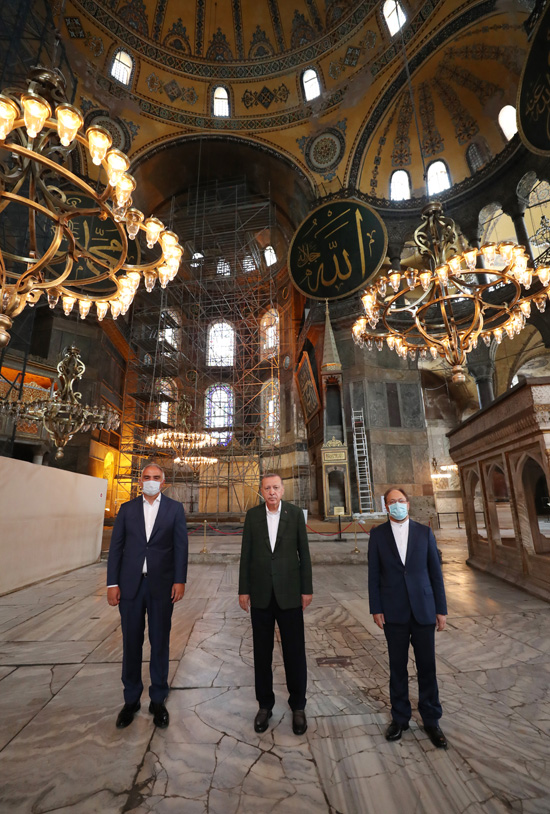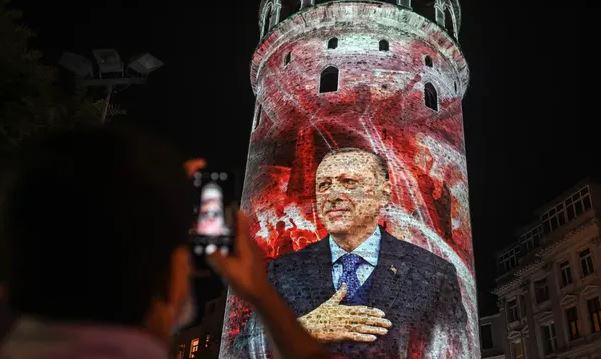The recent decision by the Turkish government to reconvert Hagia Sophia into a mosque, as well as anti-Armenian statements made by various Lebanese media figures, have rightfully concerned the Armenian community. In the face of renewed Turkish aggression, we have to ask: what is Turkey thinking? To answer this, we have to examine beyond the centuries-long hostility between the Turks and Armenians and look at broader trends within the Middle East.
The past decade of Middle Eastern politics can be described as a proxy war between the region’s two powers: Saudi Arabia and Iran. This can be most clearly seen in the two bloody Civil Wars in Yemen and Syria that have characterized the past decade. In Syria, Saudi-funded rebels attempted to overthrow the Iranian-backed dictatorship of Bashar al-Assad. In Yemen, the opposite has happened, as the Saudi-backed government of Abdrabbuh Mansur Hadi attempts to quash the Iranian-backed Houthi rebels.
An important way to view this proxy war is as another iteration of Islam’s centuries long rivalry between Sunni and Shia, with Saudi Arabia representing Sunni interests and Iran representing the interests of the Shia. Look at the loyalties of the differing groups in Syria. Many Sunni Arabs in eastern Syria were sympathetic to the different Sunni radical groups in the region, such as Tahrir al-Sham, while the Shia Muslims of Syria and Iraq are supportive of the Iranian-backed Shia militias in the region. This was especially true at the beginning of the decade, but as the years have worn on dynamics have shifted. Saudi Arabia and Iran, both complicit in scores of human rights abuses, have completely discredited themselves in the eyes of many Muslims. This is especially true with Saudi Arabia, whose role in the devastating Yemeni famine has horrified international observers.
Read also
Other factors to keep in mind are the changing priorities of Saudi Arabia’s Crown Prince Muhammad Bin Salman. Saudi Arabia, once the nexus of Sunni fundamentalist Islam, is now seriously cracking down on the Wahabbist elements in its own country. Under Bin Salman’s leadership, the powers of Saudi Arabia’s puritannical religious police have been curtailed, granting women the license to drive—a turning point for women’s rights in the country.
The combination of people’s disillusionment with the Saudi regime as well as Bin Salman’s ambivalence towards Sunni radicalism has led Erdogan to pursue a role as the new political leader of Sunni Islam.
We can see Erdogan’s ambition in a number of actions that he has pursued in the past couple months. The first and most obvious is the reconversion of Hagia Sophia into a mosque. This has obvious implications. For centuries, Muslim armies made the capture of Constantinople, the center of the Christian east, their chief goal. Various Muslim Hadiths (sayings of the Islamic prophet Muhammad) predicted the submission of the Byzantine capital to Islam. When the Ottomans finally captured the city on May 29, 1453 and turned the Byzantine cathedral of Hagia Sophia into a mosque, it spelled the end of Christian political power in the Middle East and the beginning of the Ottoman Empire as the center of Sunni Islam. Ataturk converted the mosque into a museum in 1935, uncovering some of the Arabic calligraphy to reveal the centuries-old Christian icons. This move, while imperfect, signalled that Turkey was no longer an Islamic state and that it would pursue secularization.
For years now, Erdogan has been undoing Ataturk’s vision. He has cracked down on the sale of alcohol, halted the teaching of the theory of evolution, and is even suspected of aiding Sunni Jihadist groups in Syria. The reconversion of Hagia Sophia serves as a symbolic reminder that in Turkey Islam reigns supreme and that, while Saudi Arabia shrinks away from its Wahabbist legacy, Sunnis who long for a return to a more muscular Islam can turn to Istanbul instead.
The second ominous sign of Turkey’s ambition is the recent onslaught of anti-Armenian sentiments made by pro-Erdogan figures in Lebanon. Lebanon, which is dominated by the Shia Hezbollah organization, has faced increased criticism by Lebanese citizens for its corruption. Massive protests occurred just last year over endemic political corruption and economic stagnation in the country. This is where Erdogan sees his opening. The Sunni community of Lebanon, which doesn’t have nearly the same level of political representation as Shia Muslims or even Christians, and increasingly fears the domination of Hezbollah over the country, could easily turn to Turkey as a sort of protector. We should not be surprised that the bulk of anti-Armenian sentiment in Lebanon has come from the North, which is heavily Sunni.
Perhaps the most insidious result of this strategy is the propagation of anti-Armenian propaganda at pan-Muslim events in the United States. Just last year, during a Muslim American Society convention, official publications from the Turkish government denying the Armenian Genocide were distributed to visitors. The U.S. Council of Muslim Organizations, a major American Muslim Advocacy group, has also pushed Turkish propaganda, claiming that the Armenian Genocide of 1915 is taken out of historical context and that Muslim suffering during the same time period is never discussed.
The overall attempt has been to inflect a general Muslim hostility towards Christianity (which has very deep roots in Islam) with a more particular Turkish hatred of Armenians. Such an attempt, if successfully accomplished, would be a massive propaganda victory for Erdogan’s government. This would signal a shift in influence over radical Islam from the Saudis to the Turks.
How worried should Armenians be about this disturbing turn of events? In the short term, certainly this is something to worry about, but we shouldn’t be too concerned about developments in the long term. Erdogan faces increasing criticism both from within Turkey and on the international stage. Long-term demographic trends for Turkey seem to point away from a neo-Ottoman future, as the Turkish population is declining, while Kurdish birth rates skyrocket. And Turkey will need to do a lot to win the approval of the Arab world. While even the most anti-Saudi Arabs have to pay at least some respect to the monarchy for its custodianship of the two holiest mosques in Islam, very few Arabs have fond memories of Ottoman rule, even if the sultan technically was the Caliph of Sunni Islam. Most Muslims will likely scoff at Erdogan’s pretensions.
Still, Armenians should brace for increased hostility not only from the Turks, but also from the Sunni communities that they have lived with peacefully for decades. They are in turmoil right now, and Erdogan may have found them the perfect scapegoat.
Shant Eghian
Caption: Turkish President Recep Tayyip Erdogan visiting the Hagia Sophia Mosque ahead of its re-opening for Friday prayers (Photo: Presidency of the Republic of Turkey, July 19, 2020)























































